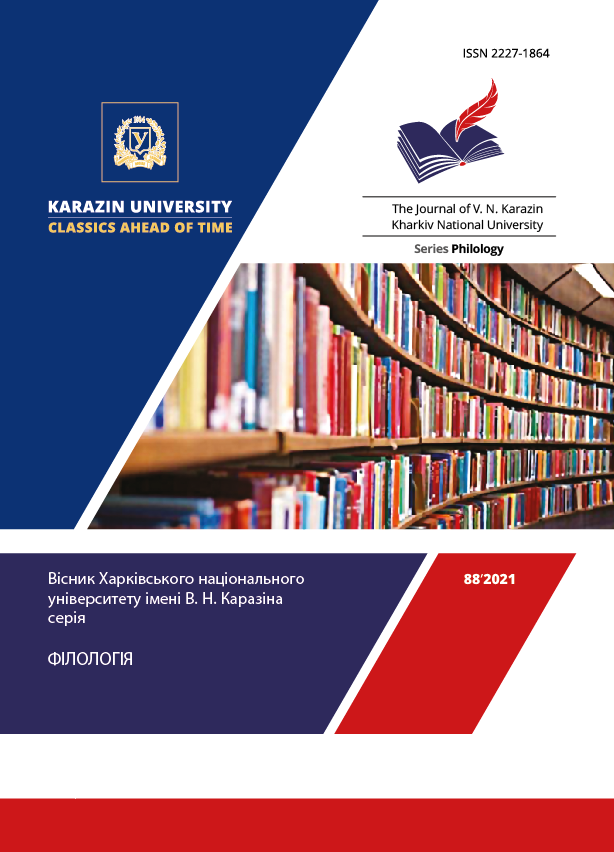До проблеми грецизмів в українських арґо
Анотація
У статті розглянуто грецькі запозичення в українських лірницько-ремісницьких арґо в контексті генези та розвитку східнослов’янських «таємних мов». Проаналізовано основні мовознавчі погляди на проблему грецизмів у білоруських, російських та українських історичних соціолектах, висловлені впродовж ХІХ–ХХІ століть, запропоновано низку критичних зауваг щодо деяких підходів до згаданої проблеми. Особливу увагу приділено критиці «протоофенської теорії» В. Бондалетова, зокрема твердженню про винятковий вплив «умовної мови» російських мандрівних торговців як «праарґо» на інші східнослов’янські соціолекти. Систематизовано й прокоментовано погляди етнографів та лінгвістів щодо позамовних причин формування спільного фонду грецизмів у східнослов’янських «таємних мовах». Численні грецизми, наявні в українських лірницько-ремісницьких арґо, досліджено на тлі інших східнослов’янських соціолектів: в основу дослідження покладено зіставний метод, що мало на меті встановлення субстандартних лексем, найближчих до грецького етимона за внутрішньою та зовнішньою формою. Це дало змогу припустити, у який конкретний соціолект чи соціолектну групу потрапляли аналізовані арґотизми, як вони ширилися далі іншими соціолектами, зазнаючи різноманітних фонетичних, дериваційних та значеннєвих трансформацій. Згаданий метод, реалізований на матеріалі грецьких запозичень у вітчизняних субстандартних системах, уможливив увиразнення авторових поглядів на генезу українських лірницько-ремісницьких арґо, зокрема чіткіше оприявнив спільний білорусько-український арґотичний масив і перехідні «контактні» соціолекти, які запозичували велику кількість лексем із зазначеного масиву.
Завантаження
Посилання
Bondaletov, V. D. (1982). Grecheskiye zaimstvovaniya v russkom, ukrainskom, belorusskom i polskom argo (k probleme genezisa i kontaktirovaniya sotsialnykh dialektov slavyanskikh yazykov). Etimologiya 1980, 64–78.
Bondaletov, V. D. (1972). Grecheskiye elementy v uslovnykh yazykakh russkikh torgovtsev i remeslennikov. Etimologicheskiye issledovaniya po russkomu yazyku, 20–25.
Horbach, O. (1957). Argo ukrayinskykh lirnykiv. Naukovi zapysky Ukrayinskoho Vilnoho Universytetu. Filosofichnyi fakultet. Ch. 1, 5–44.
Dal, V. I. (1852). O narechiyakh russkogo yazyka. Po povodu opyta velikorusskogo slovarya izdannogo vtorym otdeleniyem imperatorskoy akademii nauk. Vestnik Imperatorskogo Russkogo Geograficheskogo Obshchestva. Ch. VІ. kn. 1, 1–72.
Lukashanets, A. G. (2009). Gretsizmy v vostochnoslavyanskikh sotsiolektakh. Movу ta kulturу u noviy Yevropi: kontakty i samobutnist: zbirnik naukovykh dopovidey, 383–390.
Priyemysheva, M. N. (2009). Taynyye i uslovnyye yazyki v Rossii ХІХ v. Sankt-Peterburg: Nestor-Istoriya. Ch. 2.
Redko, Ye. (2020). «Dvi slovi» pro henezu ukrainskykh argo. Acta universitatis palackianae olomucensis. Facultas philosophica. Philologica 2020. Ucrainica IX. Současná ukrajinistika. Problémy jazyka, literatury a kultury, 109–113.
Sravnitelnyye slovari vsekh yazykov i narechiy. sobrannyye desnitseyu vsevysochayshey osoby. Sankt-Peterburg. 1787–1789. Otd. 1. 1787.
Sreznevskiy, I. I. (1839). Afinskiy yazyk v Rossii. Otechestvennyye zapiski. T. V. Otdel VII. Smes, 1–12.
Studinskiy, K. (1894). Lіrnуkу. Lvіv.
Tikhanov, P. (1899). Chernigovskiye startsy (Psalki i kriptoglasson). Trudy Chernigovskoy gubernskoy arkhivnoy komissii. Vyp. 2, 65–158.
Tikhonravov, K. N. (1857). Ofeni Vladimirskoy gubernii. Vladimirskiy sbornik. Materialy dlya statistiki, etnografii, istorii i arkheologii Vladimirskoy gubernii, Moskva, 22–27.
Fasmer, M. (1909). Greko-slavyanskiye etyudy. III. Grecheskiye zaimstvovaniya v russkom yazyke. Sbornik Otdeleniya russkogo yazyka i slovesnosti. T. 86.
Shevelov, Yu. (1995). Ukrayinske slovo vantazh i problema «argotychnykh sufiksiv». Zbirnyk Kharkivskoho istoryko-filolohichnoho tovarystva. Nova seriya. T. 4, 131–146.
Jagič, V. (1896). Die Geheimsprachen bei den Slaven. Sitzungsberichte der philos.-histor. Classe der Kais. Akademie der Wissenschaften. Bd. 133.




